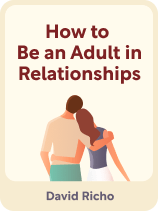

This article is an excerpt from the Shortform book guide to "How to Be an Adult in Relationships" by David Richo. Shortform has the world's best summaries and analyses of books you should be reading.
Like this article? Sign up for a free trial here.
What’s “mindful loving”? Do you want a long-lasting, healthy, and fulfilling love?
In How to Be an Adult in Relationships, David Richo says the secret to a stable relationship is mindful loving. It’s a compassionate, realistic approach to love based on the Buddhist practice of mindfulness.
Read below for a brief overview of How to Be an Adult in Relationships.
How to Be an Adult in Relationships by David Richo
In How to Be an Adult in Relationships, David Richo argues that mindfulness is the key to strong, healthy relationships. Drawing from both Eastern philosophy and Western psychology, he explains how mindful loving can heal your psyche, help you succeed in intimate relationships, and build a better, more loving world.
This overview presents Richo’s ideas in four parts:
- In Part 1: What It Means to Love Mindfully, we’ll explain what mindfulness is, why mindful loving can strengthen your relationships, and how to love mindfully.
- In Part 2: Becoming Someone Who Can Love Mindfully, we’ll examine how your parents’ love shaped your adult capacity for love and how you can heal emotional wounds that hold you back from loving mindfully.
- In Part 3: How Mindful Love Strengthens and Sustains Relationships, we’ll discuss how mindful loving can stimulate psychological growth, help you navigate relationship changes, and enable you to end relationships gracefully.
- In Part 4: Loving Well Means Loving the World, we’ll dive into what Richo considers the ultimate goal and benefit of learning to love mindfully: increasing your capacity for universal loving-kindness.
Part 1: What It Means to Love Mindfully
Richo’s relationship advice is rooted in the Buddhist concept of mindfulness, the practice of witnessing the present without evaluating, judging, or trying to influence it. When you’re mindful, you simply notice what you’re actually experiencing right now.
He argues that the key to a healthy relationship is a mindful approach. Specifically, he suggests adopting mindful loving: the practice of seeing your partner, yourself, and your relationship as each really is in the present, without imposing your interpretations.
Richo says that practicing mindfulness benefits you in three ways: It encourages you to face reality, enables you to be emotionally resilient, and facilitates compassion. When you love mindfully, these benefits can support your relationships, too. Let’s explore each.
Benefit #1: Mindfulness Encourages You to Face Reality
Richo argues that mindfulness enables you to accept reality by keeping you tethered to the present. Instead of allowing your mind to come up with interpretations of events that may or may not be accurate, mindfulness requires you to focus on the verifiable facts of a situation—what you’re actually experiencing.
Benefit #2: Mindfulness Enables You to Be Emotionally Resilient
Richo also explains that mindfulness teaches you that you’re strong enough to handle all of your feelings, perceptions, and experiences, no matter how uncomfortable they may be.
Benefit #3: Mindfulness Facilitates Compassionate Validation
Richo explains that mindfulness encourages you to assume a compassionate view of reality—when you see things as they really are, you’ll discover two things:
- Every living being is irrevocably divine, fundamentally good, and capable of both loving and being loved.
- The universe itself is compassionate since it generously provides you (and all other forms of life) with everything you need to survive—and often even more than that.
When you adopt the view that all life has inherent lovability, you’ll be able to feel compassion for others—even if you disagree with them, are upset with them, or simply can’t relate to them.
To Love Well, Be GREAT to Your Loved Ones
Richo says that mindful love has five key aspects that can be applied in all kinds of relationships: attention, acceptance, appreciation, affection, and allowing. We’ll call this the GREAT model—Gratitude, Respect, Engagement, Affirmation, and Tenderness—to help you remember that these practices are key to a great relationship.
Let’s look at each of these practices in further detail:
Gratitude
When you show gratitude for your loved one, you make them feel that they’re valuable, you like them, and you’re glad they exist. For example, if you appreciate that your child is kind, you might tell them that you feel lucky to know such a kind person. Richo says that gratitude is an important aspect of loving relationships because it helps the recipient feel worthy of being loved.
Respect
When you show respect for someone, you support their intrinsic right to live freely rather than trying to exert control over them. For example, if your partner adheres to a different faith than you do, you respect their religious practice, even if you disagree with the principles of their religion. Richo argues that respect is important because it encourages your loved one to show up in the relationship as their true self.
Engagement
When you engage with someone, you show sincere interest in them. For example, you might engage with your friend by listening to them talk about something they’re excited about. Richo says that engagement is important because it helps your loved one feel like they matter to you.
Affirmation
When you affirm someone, you let them know that you welcome their true nature: their strengths, weaknesses, flaws, and talents. For example, you might affirm your partner by telling them they’re a great cook if they make you a delicious dinner. According to Richo, one reason affirmation is important is that it makes your loved one feel that you understand who they really are.
Tenderness
When you show someone tenderness, you display feelings of devotion and care for them. For example, you might show your partner tenderness by making a point to tell them you love them every day. Richo explains that tenderness supports healthy relationships by making both physical and emotional intimacy possible.
Part 2: Becoming Someone Who Can Love Mindfully
Even if you know how to love mindfully, Richo says, you’ll need to do some inner work to become someone who can love mindfully—an emotionally mature person. In this section, we’ll explain how your parents’ love shaped your ability to love mindfully—and how to emotionally mature by healing any childhood wounds you may have sustained. Finally, we’ll explore how emotional maturity prepares you to approach romantic relationships in a healthy way.
Your Parents’ Love Shaped Your Capacity for Mindful Love
According to Richo, the love you received from your parents as a child set the stage for your adult love life. If your parents always loved you mindfully, then you’re set to become an emotionally mature adult: someone who knows how to give and receive mindful love. On the other hand, if your parents ever made you feel hurt or underloved, you sustained childhood wounds that can hold you back from becoming emotionally mature.
Richo explains that these childhood wounds can interfere with your ability to love mindfully in adulthood in three ways: You accept inadequate love, you expect your partner to fill a parental role, and/or you’re afraid of intimacy.
How to Heal Your Childhood Wounds and Grow Emotionally
Richo says that you can overcome your childhood wounds and reach emotional maturity by learning to mindfully love yourself. Loving yourself leads to maturity because it gives you a strong sense of self-worth and a sense of responsibility for meeting your own needs.
Richo suggests three key self-love practices that can help you mature: recognizing your inherent lovability, setting healthy boundaries with others, and compassionately validating yourself.
Part 3: How Mindful Love Strengthens and Sustains Relationships
Once you have the emotional maturity to be a good partner and find a good partner, Richo says, you’ll create relationships that are not only strong but also continue to help you heal and mature.
In this section, we’ll discuss how mindfully loving relationships encourage you to grow and become more secure. Then, we’ll explore how mindful loving helps you navigate the changes that occur naturally over the course of a relationship.
Mindfully Loving Relationships Encourage You to Grow
Richo says that mindfully loving relationships encourage psychological growth in three ways: They provide the opportunity to process your issues, make compassionate validation possible, and improve your self-esteem.
Mindful Loving Helps Your Relationship Withstand Change
In addition to supporting your healthy changes, mindful loving helps you withstand changes. Richo argues that all successful relationships happen in three phases—the honeymoon phase, the discordant phase, and the devotion phase. Mindful loving enables you to navigate and transition between these phases and transition between them in a way that makes your relationship stronger.
Mindful Loving Helps You End Relationships Gracefully
According to Richo, mindful loving helps you recognize when it’s time to end a relationship. He says that it’s time to break up when the relationship is no longer viable because the seriousness of your issues surpasses your or your partner’s ability to deal with them—continuing the relationship would hurt you or your partner.
Part 4: Loving Well Means Loving the World
At this point, you know why mindful love is so important to strong relationships and may have started bringing GREAT aspects to your own relationships. This sets you up to strive for universal loving-kindness, the Buddhist tenet that requires compassion for all living beings.
According to Richo, this is the ultimate goal of learning how to love mindfully. Romantic relationships teach you to honor your partner’s inherent lovability despite flaws and conflicts—he sees this as a small-scale way to practice extending compassion to everyone.
Why You Should Strive for Universal Loving-Kindness
Richo says that universal loving-kindness should be your ultimate goal because it has two major life-improving benefits: It gives your life meaning and it improves society.
First, Richo says that universal loving-kindness compels you to help others when they’re suffering, which will make your life feel more meaningful. For example, if you see that your neighbor is struggling to afford food, you might practice universal loving-kindness by helping them buy groceries. You may not be able to solve world hunger on your own, but you can be part of the solution in small ways.
Second, universal loving-kindness is necessary for the well-being of global society. Because loving-kindness emphasizes our common humanity, it enables you to relate to others as equals and overcome conflict collaboratively, rather than destructively.

———End of Preview———
Like what you just read? Read the rest of the world's best book summary and analysis of David Richo's "How to Be an Adult in Relationships" at Shortform.
Here's what you'll find in our full How to Be an Adult in Relationships summary:
- The secret to a long-lasting, loving relationship
- How to overcome emotional wounds that hold you back from loving
- How the Buddhist concept of mindful loving can create a better world






